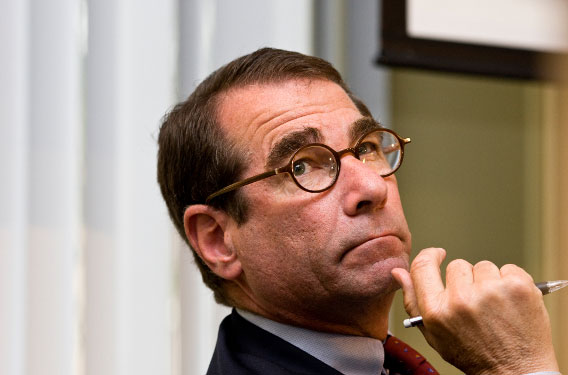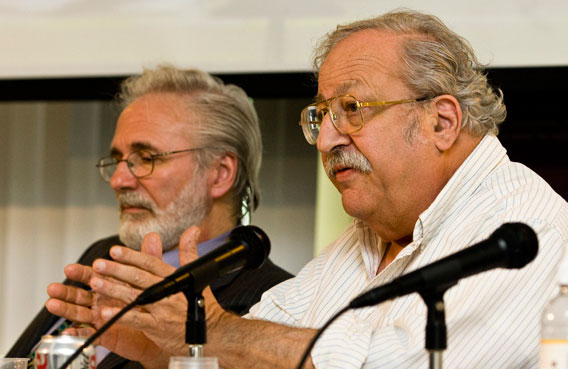What We Can Do for Our Country
Conference at Tisch College debates the nature of active citizenship in the age of Obama
By Helene Ragovin
On December 5, 2007, then-candidate Barack Obama made the following declaration:
“… I won’t just ask for your vote as a candidate; I will ask for your service and your active citizenship when I am President of the United States. This will not be a call issued in one speech or program; this will be a central cause of my presidency.”

“I think Obama’s civic agenda has done nothing less than change the civic culture of America,” Alan Solomont, A70, said at the conference, which was taped for later broadcast on C-SPAN. Photo: Joanie Tobin
On July 24, six months into the Obama presidency, seven scholars and leaders in the field of civic engagement gathered to examine the implications of this sweeping call to service, and to envision how an administration founded on such principles might proceed.
The occasion was the concluding conference of the first Summer Institute of Civic Studies at the Jonathan M. Tisch College of Citizenship and Public Service.
Alan Solomont, in his keynote address, likened Obama’s early and intense focus on civic engagement to no less than John Kennedy’s historic challenge to “ask not what your country can do for you; ask what you can do for your country.”
“I think Obama’s civic agenda has done nothing less than change the civic culture of America,” said Solomont, A70, the chair of the board of directors of the Corporation for National and Community Service and a Tufts trustee. The corporation is the nation’s largest grantmaker for volunteer activities, and coordinates programs such as Senior Corps, AmeriCorps and VISTA. “Obama had a transformative experience as a community organizer,” Solomont said. “In fact, I believe his commitment is much stronger than many of us realized.”
While each of the panelists took a slightly different approach to the subject, what emerged, for the most part, was the message that individual involvement with civil society is assuming new forms, and Obama’s message and political agenda are in many ways hastening this transformation.
At the same time, several speakers also stressed that active citizenship is a very specific form of civic engagement.
The Obama campaign and administration so far “have re-ordered the civil values of America and redefined what it means to be a citizen,” Solomont said. During the campaign, the participation of millions of volunteers on a grassroots level signaled a “sea change” in electoral politics, Solomont said.
“Today there is a huge uptick in Americans who are interested in national and community service,” he said, as evidenced by increased applications for AmeriCorps and the Peace Corps. “Every community service organization has many more applicants who want to serve than they can accommodate. Volunteering in the community is on the rise.”
And, he added, much of this change is being driven by the emerging generation of “Millennials,” those born between 1980 and the early part of this century. Categorizing these young people as the most civic-minded since the “Greatest Generation” that came of age during World War II, Solomont said Millennials “are united across gender and race in their desire to find win-win solutions.” Galvanized by common experiences such as 9/11, Hurricane Katrina and the economic crisis, they have been volunteering in greater numbers than previous generations.
“What I want to suggest, in the administration now and in society more broadly, is not one ethic [of civic engagement], but several,” said Archon Fung, the Ford Foundation Professor of Democracy and Citizenship at Harvard’s John F. Kennedy School. “And not all of those ethics fit together. There is some tension between them.”
Not Just Charity Work
Marshall Ganz, a lecturer in public policy at the Kennedy School, distinguished among different types of civic spheres, specifically philanthropic service, active citizenship and social innovation and entrepreneurship, which, he said, represent three different approaches.
“Philanthropic service is a wonderful thing, but it has little to do with politics and very little to do with citizenship, from my point of view,” Ganz said. “Social entrepreneurship is an interesting thing for using as a model and coming up with solutions, but it’s not citizenship. You really have to make that distinction. Then we have to ask the administration, where is our energy going to go?”

“Philanthropic service is a wonderful thing, but it has little to do with politics and very little to do with citizenship, from my point of view,” said Marshall Ganz, right, a lecturer in public policy at the Kennedy School. At left is Carmen Sirianni, a professor of sociology and public policy at Brandeis. Photo: Joanie Tobin
Civic service involves an obligation on the part of all citizens to serve the whole of society, which is quite different than charity, he said. An example of civic service would be the behavior of the “Greatest Generation” during World War II, in which the majority engaged in activities for a common national purpose, whether that was serving in the military or civilian support roles related to the war.
“There’s a citizen agenda there to be developed, but it’s not there yet,” Ganz said. And, he added, this is a key time for the U.S. to develop a new civic agenda. One of the legacies of the previous administration, he said, was that George W. Bush “used challenges as a way of weakening our democratic institutions. Can we use challenges to strengthen our democratic institutions?”
Carolyn Lukensmeyer, the founder and president of AmericaSpeaks, an organization that facilitates large-scale town meetings, echoed the idea that Obama’s call to service has hit already-fertile ground.
“He and his team joined a movement and force happening already—and they did it wisely and strategically,” she said. “The big, big mistake that we make at these kinds of forums is that we ask ‘what is Obama doing?’ when this is a question every person needs to be asking on a continual basis. Are we doing what we can do, to be the kind of country and democracy we want to be?”
The U.S., Lukensmeyer said, has always had an “aspirational democracy” and an “actual democracy.”
“What is unusual is that we have the chance to make institutional changes in that gap that we haven’t seen the likes of for 30 or 40 years, or longer,” she said.
Acknowledging that both community service and civic engagement face various limitations—and that the Obama administration is still quite new—the power of collective action around common interests is significant, Solomont said.
Among the other panelists were Harry Boyte of the Hubert H. Humphrey Institute of Public Affairs at the University of Minnesota; Xolela Mangcu of the University of Johannesburg; and Carmen Sirianni, professor of sociology and public policy at Brandeis. Boyte and Mangcu participated via video-conference from South Africa.
Helene Ragovin can be reached at helene.ragovin@tufts.edu.


